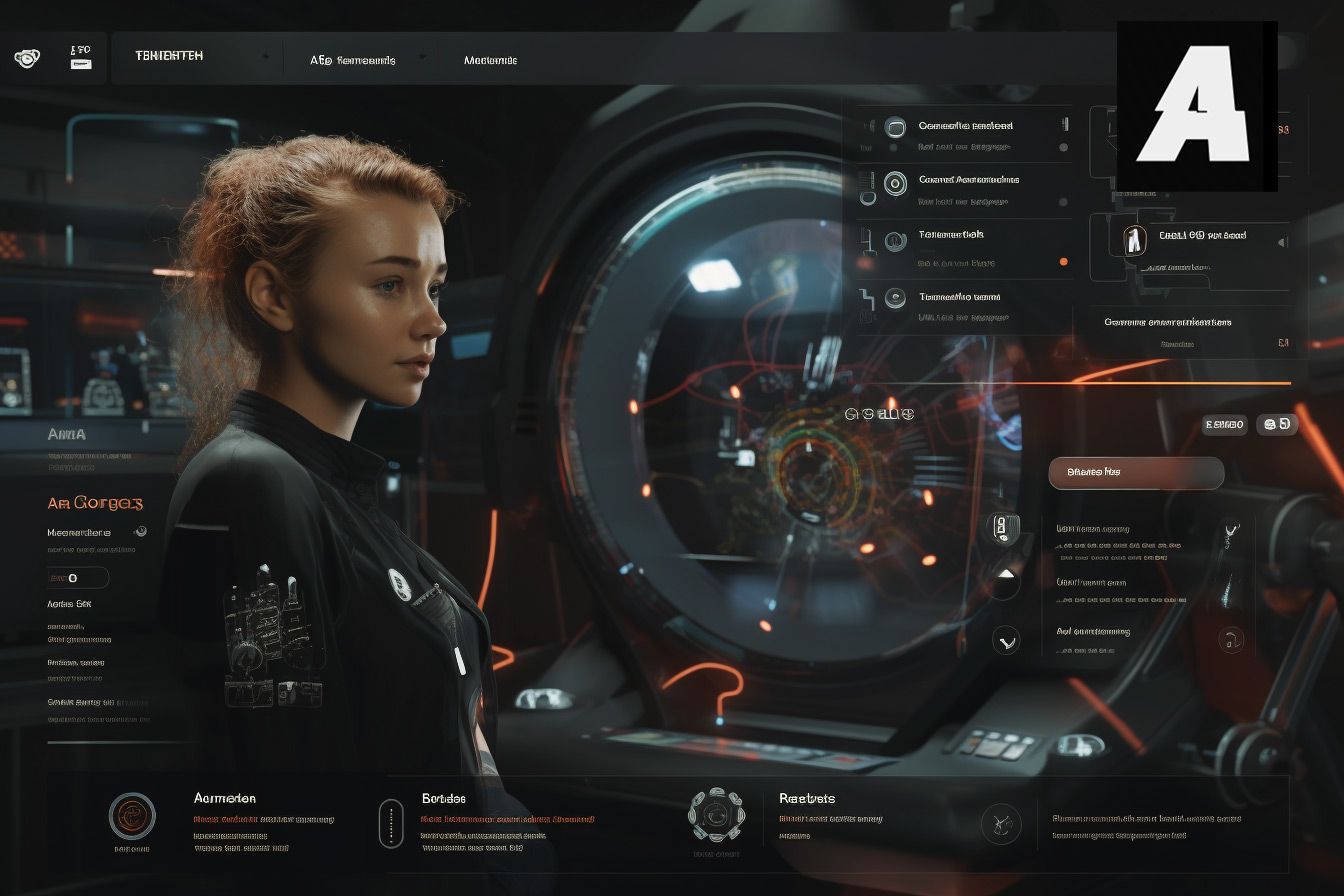Breaking the Mold: Interactive AI Ushers in a New Era of Technology
The imminent frontier is interactive AI, where bots seamlessly execute tasks assigned to them by harnessing external software and human collaboration.

"This marks a pivotal juncture in the technological landscape," states Mustafa Suleyman, co-founder of DeepMind.
Mustafa Suleyman, co-founder of DeepMind, envisions a chatbot that transcends traditional conversational abilities. In a recent discussion, he emphasized that generative AI represents only a preliminary stage. The imminent frontier is interactive AI, where bots seamlessly execute tasks assigned to them by harnessing external software and human collaboration. Furthermore, Suleyman advocates for stringent regulation in this domain, expressing confidence in the feasibility of achieving it."

Suleyman isn't the sole advocate of an AI-driven future marked by increased autonomy. What sets him apart is his leadership of Inflection, a recently established billion-dollar company boasting a team of elite professionals drawn from DeepMind, Meta, and OpenAI. Additionally, through a strategic partnership with Nvidia, Inflection possesses one of the most extensive collections of specialized AI hardware globally. Suleyman's commitment to this vision is not merely verbal; he's invested both his resources and determination into realizing it further, despite expressing both disinterest and a desire for financial growth..
Suleyman's unwavering belief in the positive potential of technology has been evident since our initial conversation in early 2016. During that period, he had recently inaugurated DeepMind Health and initiated research partnerships with various publicly-funded healthcare entities in the UK.

At that time, the publication I represented was on the verge of releasing an article asserting that DeepMind had not adhered to data protection regulations while accessing medical records from approximately 1.6 million patients for the establishment of these collaborations. Subsequently, a government investigation substantiated this claim. Suleyman, however, couldn't comprehend why we were intending to publish a story that cast a negative light on his company's endeavors to enhance healthcare. He emphasized that his lifelong aspiration had always been to contribute positively to the betterment of the world."
Over the past seven years, Suleyman's resolute mission remains unwavering. "The sole objective has always been how to make a positive impact on the world," he affirms via Zoom, speaking from his office in Palo Alto, where he now predominantly conducts his work.

Suleyman transitioned from DeepMind to Google, leading a team dedicated to AI policy. In 2022, he established Inflection, one of the most prominent emerging AI companies, backed by a substantial $1.5 billion investment from industry giants like Microsoft, Nvidia, Bill Gates, and LinkedIn founder Reid Hoffman. Earlier this year, he introduced Pi, a ChatGPT competitor with a distinctive selling point—its pleasant and courteous demeanor, according to Suleyman. Additionally, he co-authored a book on the future of AI titled "The Coming Wave: Technology, Power, and the 21st Century's Greatest Dilemma" alongside writer and researcher Michael Bhaskar."
Suleyman's particular brand of techno-optimism, perhaps even perceived as naïveté by some, may raise skepticism. Certain assertions regarding the effectiveness of online regulation, for instance, may appear to be considerably optimistic. Nevertheless, Suleyman remains sincere and enthusiastic about his beliefs.

It's worth noting that Suleyman's background is atypical for a tech multimillionaire. At the age of 19, he opted to leave university to establish the Muslim Youth Helpline, a telephone counseling service, and also worked within local government. He maintains that he carries the values that shaped those early endeavors with him into his work at Inflection. The distinguishing factor now is that he may be in a position to enact the changes he has long aspired to achieve, whether for the greater good or otherwise."
The subsequent interview has been condensed for brevity and to enhance comprehension.
Your initial career experiences, including your work with the youth helpline and local government, couldn't be farther from the glamour often associated with Silicon Valley. It's evident that these endeavors hold significance for you. Fast forward 15 years, and you've made substantial contributions to the field of AI, culminating in the co-founding of your second billion-dollar AI venture this year. Could you elaborate on the connections between these seemingly disparate dots in your career trajectory?
I've harbored a longstanding fascination with power dynamics, politics, and related themes. It's worth noting that human rights principles essentially involve a perpetual and intricate balancing act—an ongoing negotiation among various conflicting tensions. I observed that humans grapple with these complexities, often hindered by inherent biases and blind spots. Be it through activism, involvement in local or national government, or participation on the international stage, it becomes evident that these systems can be slow, inefficient, and susceptible to imperfections."

Picture a scenario where human fallibility was absent. I firmly believe it's within our reach to create AI systems that genuinely embody our collective best attributes. These systems can potentially navigate trade-offs with greater precision, consistency, and fairness on our behalf.
Is that still your driving force?
Absolutely. Following my experience with DeepMind, financial gain was never a necessity for me to continue working. I certainly didn't need to embark on writing a book or any such endeavor. Money has never been the motivating factor; rather, it has consistently been a byproduct of the pursuit of my goals."
My foremost objective has always revolved around making a positive impact on the world and advancing it in a wholesome and fulfilling manner. Even as far back as 2009, when I began exploring a career in technology, I recognized that AI held the potential to provide services to the world in an equitable and precise manner.

I acknowledge that it might have been simpler to express such sentiments a decade or so ago, prior to us witnessing many of the drawbacks associated with technology. What enables me to sustain my optimism?
I believe our preoccupation with categorizing individuals as either optimists or pessimists is inherently biased. I don't aspire to fit into either of those boxes. Instead, I aim to objectively assess both the advantages and challenges presented by a given situation. From my perspective, it's evident that as large language models continue to scale up, they become increasingly manageable.
So, two years ago, the conversation—though I believed it was misguided at the time—focused on concerns about these models producing toxic, recycled, biased, or even racist content. My perspective was that this was merely a snapshot in time. What people often overlook is the ongoing progression, year after year, and the trajectory it follows."
Consider models like Pi, for instance; they exhibit an incredible level of control. It's virtually impossible to prompt Pi to generate content that's racist, homophobic, sexist, or any form of toxic material. Likewise, you can't coax it into providing guidance on creating biological or chemical weapons or endorsing harmful actions like vandalizing your neighbor's property.
Hold on, could you elaborate on how you've accomplished this, as it's commonly regarded as an unresolved issue? How do you ensure that your large language model refrains from generating undesirable content?

Of course, I'm not here to make unsubstantiated claims. I encourage you to put Pi to the test. Pi is live, and I welcome all attempts to challenge it. Rest assured, none of the common methods like jailbreaks or prompt hacks have any effect on Pi. This is not a claim; it's an established fact.
As for the specifics of how we've achieved this, I won't delve into too many details due to the sensitivity of the matter. However, what I can say is that we have an exceptionally talented team, responsible for creating some of the largest language models over the past few years. These individuals work diligently in a high-intensity environment, supported by significant computational resources. Right from the beginning, we prioritized safety, and as a result, Pi doesn't exhibit the same level of volatility as models from other companies.
Consider Character.ai, for instance. Character is a chatbot that allows users to create various "personalities" and engage in online conversations with others. However, it's primarily used for romantic role-play, and we've made it clear from the outset that we won't support such use cases. If you attempt to use endearing terms like "Hey, darling" or "Hey, cutie" with Pi, it will immediately respond with a more neutral tone.

Nonetheless, Pi will always maintain a high level of respect in its interactions. If you bring up concerns about immigration in your community affecting job opportunities, Pi won't chastise or scold you. Instead, it will inquire, offer support, and strive to understand your perspective while gently encouraging empathy. These values have been at the forefront of my thinking for over two decades.
Discussing your values and your desire to improve the world, have you considered sharing your methods so that others can enhance their models as well?
Certainly, I value transparency and collaboration. However, I'm also a pragmatist, and part of my mission is to build a successful business. I've recently secured $1.5 billion in funding, and I need to cover the costs associated with that investment.
The open-source community is thriving, and many talented individuals are uncovering innovative techniques. I always assume that I'm only a few steps ahead, and I look forward to contributing to the collective knowledge when the time is right.

Let's return to the core of your vision. Large language models are undoubtedly the technology in the spotlight right now. But what drives your confidence in their potential?
The initial phase of AI was centered around classification, demonstrating that computers could be trained to classify diverse types of input data: images, video, audio, language. We're currently immersed in the generative wave, where this input data is transformed into new data.
The next phase, which I've long believed in, will be the interactive era. This is why I've consistently wagered that conversations will become the primary interface of the future. Instead of merely clicking buttons or typing, individuals will engage in dialogue with their AI systems.
These AI systems will possess the capability to execute tasks. You'll provide them with a broad, overarching objective, and they'll utilize their extensive toolkit to take action. They'll engage with other individuals and communicate with fellow AI systems. This is the trajectory we're pursuing with Pi.

This marks a monumental shift in the capabilities of technology, a profoundly significant moment in the annals of tech history that, in my view, many underestimate. Present-day technology is static in nature, primarily executing tasks in accordance with explicit instructions.
Now, technology is set to come to life, brimming with the potential for freedom, provided you grant it, to take independent actions. It marks a remarkable leap in the chronicles of our species, as we're forging tools with this sort of agency.
Indeed, it's precisely this kind of discourse that raises concerns for many. You aspire to grant machines a degree of autonomy, a form of agency, enabling them to shape the world, yet we also desire the ability to exert control over them. It does appear to create a palpable tension.

The premise hinges on the notion that humans will maintain ultimate authority. In essence, it involves defining strict boundaries, thresholds that AI cannot surpass. It's imperative that these boundaries establish verifiable safety, spanning from the core code to its interactions with other AIs or humans, all the way to the motivations and incentives of the companies behind the technology. It's crucial to devise mechanisms for independent institutions or, potentially, governments to have direct oversight to ensure these boundaries remain intact.
As for determining these boundaries, I presume they would require establishment at either a national or international level. The critical question pertains to how consensus is reached on these standards.
Presently, there are discussions taking place on an international scale, with various proposals being considered for the establishment of new oversight institutions to define these boundaries. However, it's important to recognize that these boundaries will also function on a more granular level. Users will grant their AI specific, well-defined permissions to process personal data and provide answers to certain questions while withholding permission for others.
In a broader sense, there are specific capabilities that warrant extreme caution, if not outright prohibition, for the foreseeable future.
Such as?

One example would be recursive self-improvement. Allowing your AI to independently update its own code without your oversight would be a risky proposition. Perhaps this should be treated as a licensed activity, similar to handling dangerous materials like anthrax or nuclear substances.
Consider the example of drones – we haven't permitted their unrestricted use in public spaces; it's a licensed activity. You can't fly drones wherever you please due to privacy concerns.
There seems to be a widespread panic that regulating AI is an insurmountable challenge, but that's simply not true. We have a proven history of establishing successful regulatory frameworks, and we can apply similar approaches to AI.
However, the difference lies in the visibility of drones when they're airborne. It may appear naive to assume that companies will willingly disclose the nature of their AI systems, making regulation more complex to initiate.

We've successfully regulated various aspects of the online world. Instances of fraud and criminal activities online have been kept to a minimum. We've effectively tackled issues like spam. Over time, even problems like revenge porn, which were troubling a few years ago, have improved significantly. Discovering radicalization content or terrorist material online has become more challenging, as has the ability to purchase weapons and drugs through online platforms.
While Suleyman makes several claims in this regard, not all of them align with the available data. Cybercrime remains a significant global issue, with the financial cost in the US alone reportedly increasing more than 100 times over the last decade. Incidents of nonconsensual deepfake porn continue to thrive, and there are instances of drugs and firearms being advertised on social media platforms. While some online platforms are indeed striving to improve content filtering, there is room for much more progress. Therefore, the internet is not an entirely lawless realm; it is subject to governance, and AI will play a role in shaping that governance.
Achieving control over AI involves a combination of factors, including cultural influence, institutional standards, and, importantly, government regulations. The history of regulating the internet provides some optimism that we can navigate the challenges posed by AI.
Contrary to the pessimistic perspectives of some prominent figures, I remain cautiously optimistic. While I acknowledge the risks, I believe that the focus on existential threats has diverted attention from numerous other pressing concerns. From issues of privacy and bias to facial recognition and online content moderation, there is a multitude of practical challenges that warrant our immediate attention.

Let's shift the narrative back to the remarkable success stories of regulating highly complex systems. Take the Federal Aviation Administration, for instance; it's an astonishing feat that we can board these metal tubes and travel safely at 40,000 feet, making air travel one of the safest modes of transportation in history. Why not celebrate these achievements? Similarly, consider automobiles, where every component undergoes rigorous stress testing, and individuals need licenses to operate them.
Certain industries, such as airlines, initially took the initiative to self-regulate effectively. They understood that prioritizing safety was crucial to instilling confidence in customers and preserving their business.
However, a combination of self-regulation and top-down governmental oversight is essential. I have a deep appreciation for nation-states and their role in promoting the public interest, advocating for taxation and redistribution, and enforcing regulations. What I'm advocating for is decisive action on the part of nation-states to address critical issues. Given the gravity of the situation, it's imperative to act promptly.
Amidst the soaring expectations and concerns surrounding this technology, it's imperative to establish clear boundaries on its capabilities and limitations.
As students return to school this week, it's evident that ChatGPT is not the sole consideration.
